 Abengoa
Abengoa
Annual Report 2009
- Corporate Social Responsibility Report
- Abengoa and Its Customers
- Product and Service Quality, Safety and Security
Ever since its inception, Abengoa has always striven to ensure that its products and services are designed with full customer satisfaction in mind. This commitment was explicitly inserted into the Common Management Standards (NOC) governing all group companies. These norms establish the obligation to implement and certify quality management, environmental management and prevention systems in compliance with international ISO 9001 and ISO 14001 standards, as well as the BS OHSAS 18001 specification.
Effective implementation of the management systems is ensured by the guidelines set by the management in its policy on quality, environment and occupational risk prevention; and also by the proposed annual objectives and their ongoing monitoring, coupled with continuous improvement, training and the unconditional support provided by all Abengoa personnel.
The general management team holds the overall duty of ensuring proper functioning of the management systems within each of the companies. This responsibility is delegated to the Quality, Environment and Prevention Management Department, which ultimately oversees compliance with prevailing regulations, procedures and legislation.
The corporate department of Organization, Quality and the Environment, has the responsibility, in environmental affairs, of reporting to Abengoa’s Chairman’s Office on the progress and status of the Management Systems throughout the different group companies. This oversight is led by the general coordinator for Quality and the Environment, who verifies fulfillment of objectives and the use made of the synergies generated through control and follow-up visits.

Management Systems Focused on Processes and Customer Health and Safety
Each Abengoa company has a process-oriented management system in place, which supports and implements the company’s policy and strategy and which is geared towards ongoing improvement, in accordance with the requirements imposed by international standards. Within this context, it is the management system itself, along with its control and monitoring mechanisms, which ensures that the impacts on customer health and safety are duly assessed during each of the lifecycle phases of the company’s products and services.
There were no reported incidents in 2009 through Abengoa’s information channels deriving from failure to comply with legal regulations or voluntary codes and associated with the impacts of products and services on health and safety during their lifecycle.
ISO 9001, ISO 14001 and OHSAS 18001 certifications
ISO 14001

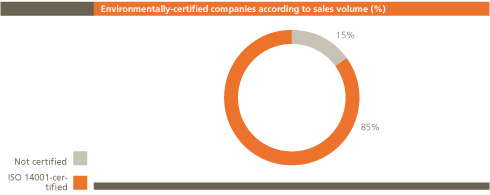
ISO 9001

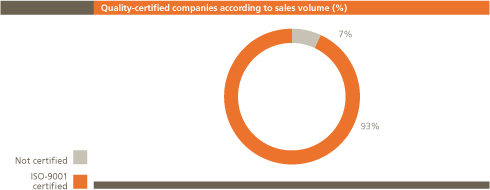
OHSAS 18001

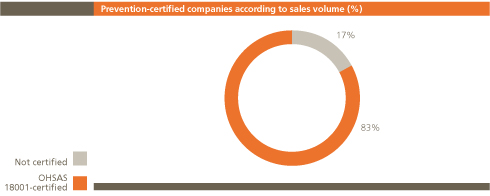
The number of quality-certified companies climbed by 1.83% over 2009. The drop in the percentage of environmentally-certified companies is largely due to recently created companies that are still integrating their management systems.
Case Study Safety and Security Measures in Telvent Ticketing Systems
True to its commitment to sustainable development, safety, security and the environment, Telvent offers its customers, with the aim of improving urban mobility and creating sustainable urban environments, management solutions that help to facilitate and encourage the use of public transportation, including ticketing systems for subway and commuter train networks. Telvent has implemented these systems in cities such as Madrid, Barcelona and Bilbao (Spain), Monterrey (Mexico) and Tiajin (China).
To ensure proper operation of the ticketing systems manufactured by Telvent and the security of future users, verification is conducted, in approved laboratories, of compliance with all requirements stipulated under the Information Treatment System Security Standard (UNE EN 60950), the 1999/5/EC Electromagnetic Compatibility Directive and the Low-Voltage Electrotechnical Regulations according to 2006/95/EC.
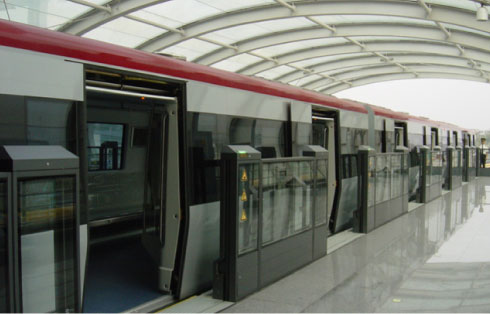
Subway access system in Tiajin (China)
Compliance with standards and norms ensures the security of these systems for their users by taking aspects such as the following into account: low electromagnetic interference emission levels, immunity to outside interference, sufficient protection against electrical faults, grounding of metal components, and protection and labeling of points involving electrical or mechanical risk to maintenance personnel.
Prior to this, and during the process of machine manufacturing, burrs or excess material are eliminated and the edges of mechanical pieces are smoothed to prevent cuts. In addition, all equipment undergoes insulation and dielectric withstand testing in order to make sure that cable insulation is sufficient to withstand overvoltage without causing short circuits.
Furthermore, since these systems are intended for installation in indoor stations, they are manufactured with low smoke emission and are halogen-free, while also containing low flammability plastics (UL-94 V0) in compliance with the UNE EN 60950 standard, thereby lowering risks in the event of fire and preventing intoxication and loss of visibility caused by smoke and the spread of flames.
At the functional level, the passenger access control paths incorporate security photocells that prevent doors from closing when they might hit a passenger, in addition to a sensor which detects whether a person has been trapped and automatically opens the doors.
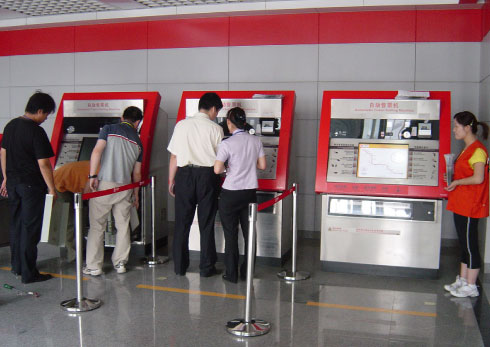
Subway ticket vending machine in Tiajin (China)
The design of these passageways ensures open-door security position by means of activating a general emergency button, even in the event of a lack of electrical power. This helps to prevent equipment from hampering the process of evacuating people inside the station in an emergency situation.
In turn, the ticket vending machines are equipped with anti-vandalism detectors capable of sending alarm signals to a central location in the event of an incident. In addition, they are occasionally equipped with video cameras connected to the station’s surveillance network.
Telvent guarantees safety and security for the users of the systems the company develops and manages.
Sales of ticketing systems as a percentage of total sales for Abengoa in 2009 stood at 0.18%.
2009 Milestones
- Over 2009, the number of quality-certified companies climbed by 1.83%.
Every Abengoa company features a process-oriented management system, which supports and implements the company’s policies and strategy and is geared towards continuous improvement